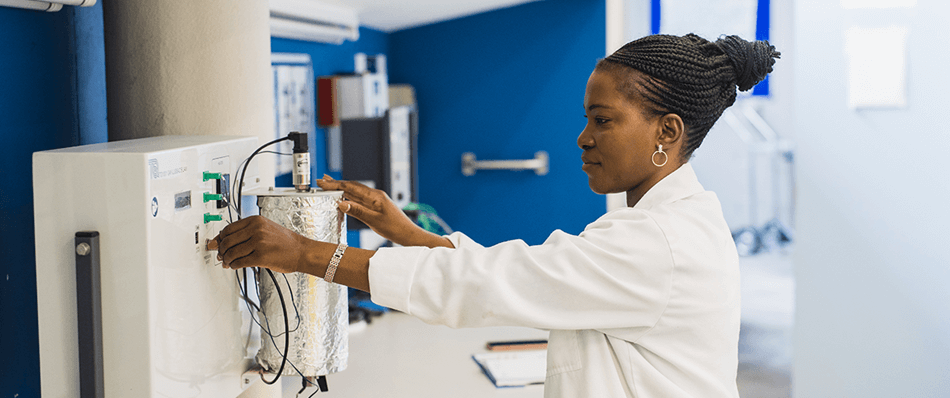
Those familiar with the Academy know that we’re a national academy with a global outlook and that our international activities have grown appreciably over the past five years or so. This is largely because of our selection by the UK government, via BEIS, as a delivery partner for Official Development Assistance (ODA) support made available through the Newton Fund and Global Challenges Research Fund.
We have used these funds to develop programmes that help build engineering capacity in low- and middle-income countries around the world and contribute to their economic development and social welfare.
One of these programmes is GCRF Africa Catalyst which aims to strengthen professional engineering bodies in sub-Saharan Africa (SSA) so that they can promote the profession effectively, share best practice and increase local engineering capacity and diversity to help drive sustainable growth.
In the past year the GCRF Africa Catalyst team commissioned the consultancy firm Ecorys to research the impact of COVID-19 on engineering and how engineering has contributed to tackling the pandemic in SSA.
Engineering in the fight against COVID19 in Sub-Saharan Africa
Engineers have essential roles to play in addressing the world’s most pressing challenges, including climate change, global poverty, and international security. It is therefore unsurprising that over the past 18 months engineering has been front and centre of global efforts to manage and mitigate the impact of the COVID-19.
The report COVID19 crisis and engineering in Sub-Saharan Africa identifies what have been the main impacts of COVID-19 on engineering in SSA and what will be the likely impacts going forward. It identifies how engineering has contributed to tackling the challenges of the pandemic, including:
- local design and manufacture of medical, protective and sanitary equipment
- rapid building of treatment, isolation and testing facilities
- collecting data, analysing and modelling the epidemic response
- funding, fundraising and direct support to vulnerable members of the engineering community
- moving education and training online
- innovations in robotics to assist with healthcare and delivery of medical treatment
The report contains numerous examples of engineering ingenuity, including those supported by Project CARE (COVID Africa Rapid Entrepreneurs) which assisted the Academy’s network of talented engineering entrepreneurs in SSA to apply their skills to find innovative solutions to local challenges arising from the pandemic, from implementing data-driven insights into health facilities to manufacturing face shields from recycled PET bottles.
Ten countries were selected to be covered in detail by the report’s authors: Botswana, Cameroon, Ghana, Kenya, Lesotho, Nigeria, South Africa, Uganda, Zambia and Zimbabwe. In half of these countries, they were able to draw on the networks built up under the GCRF Africa Catalyst programme. In the other countries, they benefited from people who voluntarily (and enthusiastically) agreed to contribute to the research. They also closely collaborated with the Federation of African Engineering Organisations (FAEO) who are current awardees of the GCRF Africa Catalyst programme.
The report offers further evidence that UK-funded research and innovation has contributed to significant global advances and we believe that the partnerships the Academy has built are a valuable mechanism for achieving development aims.
Even modest funding—when directed towards innovative engineers offering practical solutions to local challenges--can make a real difference to the health and economic development of communities. These people and projects punch above their weight when it comes to impact.
Evidence of success is bitter–sweet
Unfortunately, these latest examples of the positive outcomes arising from ODA funding come as the UK government cuts ODA funding from 0.7% to 0.5% of UK GNI, despite vociferous opposition from a significant number of its own MPs.
The government’s cuts to ODA mean the Academy’s programmes have suffered a 73% funding cut and no new activities will be permitted in 2021/22 with ODA funding.
We have been working hard to secure funding from other sources and to mitigate the effects of the reduction in ODA funding in other ways. However, it will not be possible to make up the entire funding shortfall left by the cuts and there will be an impact on the strong relationships we have built up with research and innovation partners around the world.
When the government published its Integrated Review in March the Academy’s President, Professor Sir Jim McDonald, welcomed the government’s commitment to building a strong and varied network of international science and technology partnerships and to continuing to use ODA to support partnerships addressing the Sustainable Development Goals. However, he also highlighted the need to resource that commitment and to find further ways of showing and reinforcing the UK’s leadership on key global research and innovation agendas, such as response to the pandemic and Net Zero.
Of course, the economic outlook necessitates difficult decisions. However, this reduction in funding will compromise the ability of the UK to act as a leader in addressing global challenges, particularly at a time when COVID-19 has demonstrated the critical need for global collaboration.
